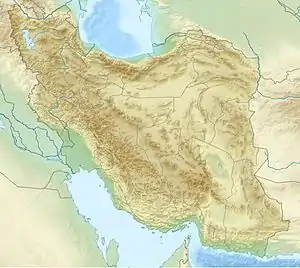 Tehran | |
| UTC time | 2014-08-18 02:32:05 |
|---|---|
| ISC event | 610785789 |
| USGS-ANSS | ComCat |
| Local date | August 18, 2014 |
| Local time | 06:02:05 IRST |
| Magnitude | 6.2 Mw [1] |
| Depth | 10 km (6 mi) [1] |
| Epicenter | 32°44′N 47°40′E / 32.74°N 47.67°E [1] |
| Type | Thrust[2] |
| Areas affected | Iran |
| Max. intensity | VIII (Severe) [3] |
| Casualties | 60–330 injured [1][3] |
The 2014 Murmuri earthquake occurred on August 18 in the Zagros Mountains of Iran with a moment magnitude of 6.2 and a maximum Mercalli intensity of VIII (Severe). The thrust earthquake injured 60–330 people and was followed by a number of high intensity aftershocks.
Earthquake
The area had not seen a large seismic event since developments in Earth observation satellites allowed scientists to more precisely study earthquakes.[2] Observations made using Interferometric synthetic aperture radar imply that different faults were ruptured by the mainshock and the largest aftershock, each leading to different surface deformations.[2]
Damage
Phone lines, water, and electricity were cut off.[4] Eight villages were hit particularly hard, each losing around half of the homes in the area.[4]
Aftershocks
In the several days following the mainshock, four strong aftershocks occurred. Within the first twenty-four hours, events with magnitudes of 5.6 Mw and 5.4 Mw occurred, each having a Mercalli intensity of VII (Very strong). Just over six hours later, a 6.0 Mw and intensity VIII (Severe) shock occurred. Several days later, a 5.6 Mw (intensity VII) shock occurred.[5][6][7][8]
See also
References
- 1 2 3 4 National Geophysical Data Center / World Data Service (NGDC/WDS) (1972), Significant Earthquake Database (Data Set), National Geophysical Data Center, NOAA, doi:10.7289/V5TD9V7K
- 1 2 3 Copley, A.; Karasozen, E.; Oveisi, B.; Elliott, J. R.; Samsonov, S.; Nissen, E. (2015). "Seismogenic faulting of the sedimentary sequence and laterally variable material properties in the Zagros Mountains (Iran) revealed by the August 2014 Murmuri (E. Dehloran) earthquake sequence". Geophysical Journal International. The Royal Astronomical Society. 203 (2): 1436–1459. Bibcode:2015GeoJI.203.1436C. doi:10.1093/gji/ggv365.
- 1 2 USGS. "M 6.2 - 40km E of Dehloran, Iran". United States Geological Survey.
- 1 2 Mullen, Jethro (August 17, 2014). "Strong earthquake hits Iran near border with Iraq". CNN.
- ↑ USGS. "M 5.6 - 39km E of Dehloran, Iran". United States Geological Survey.
- ↑ USGS. "M 5.4 - 33km SE of Abdanan, Iran". United States Geological Survey.
- ↑ USGS. "M 6.0 - 42km ESE of Dehloran, Iran". United States Geological Survey.
- ↑ USGS. "M 5.6 - 44km E of Dehloran, Iran". United States Geological Survey.
Further reading
- Motagh, M.; Bahroudi, A.; Haghighi, M.; Samsonov, S.; Fielding, E.; Wetzel, H. (2015), "The 18 August 2014 Mw 6.2 Mormori, Iran, Earthquake: A Thin-Skinned Faulting in the Zagros Mountain Inferred from InSAR Measurements", Seismological Research Letters, 86 (3): 775–782, Bibcode:2015SeiRL..86..775M, doi:10.1785/0220140222
- Rezapour, M.; Mottaghi, A. (2018), "The 18 August 2014 Mw 6.2 Murmuri, Southwest Iran, Earthquake: Aftershock Sequence Analysis", Bulletin of the Seismological Society of America, 108 (4): 1905–1917, Bibcode:2018BuSSA.108.1905R, doi:10.1785/0120170216, S2CID 135259009
External links
- Multiple techniques shed light on the August 2014 Murmuri, Iran earthquake sequence – Comet
- Two Hundred and Fifty Housing Units Are Constructed at Dehloran Affected By Earthquake Regions – ReliefWeb
- Mormori Earthquake of 18 August 2014, Mw.6.2 – International Institute of Earthquake Engineering and Seismology
- The International Seismological Centre has a bibliography and/or authoritative data for this event.